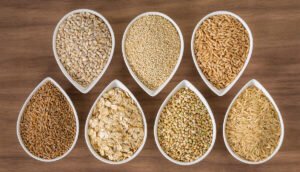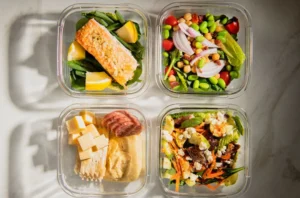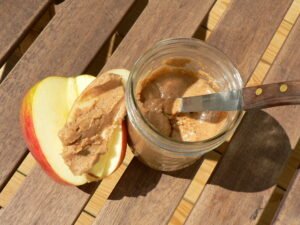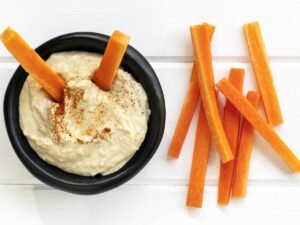How to Count Calories for Weight Loss
Share on facebook Share on linkedin Share on whatsapp Share on tumblr Share on pinterest Share on telegram Weight loss has become a primary concern for many people in modern times, when obesity is becoming an epidemic. To achieve their weight loss goals, people experiment with

Weight loss has become a primary concern for many people in modern times, when obesity is becoming an epidemic. To achieve their weight loss goals, people experiment with various diets, workout routines, and lifestyle changes. Count Calories for Weight Loss is one of the most effective and scientifically proven methods.
Table of Contents
Introduction
Count Calories for Weight Loss is a method of tracking your daily calorie intake and adjusting it to achieve a calorie deficit. A calorie deficit occurs when you consume fewer calories than your body requires, resulting in weight loss. We will delve deeper into the concept of counting calories to lose weight, its benefits, and how to get started in this article.

Calorie Calculation
Before we get into details on how to count calories, it’s critical to understand the fundamental concept of what a calorie is. A calorie is a unit of energy used to calculate the amount of energy in the foods and beverages we consume. This metric is based on the amount of energy required to raise the temperature of one kilogram of water by one degree Celsius. This seemingly simple unit of measurement is critical to understanding our nutritional intake and its impact on our bodies.
The human body, like an intricately designed machine, requires a constant supply of energy to perform its numerous functions. This energy is obtained directly from the foods we swallow. In essence, calories serve as the fuel that propels our physiological activities, from breathing and circulating blood to more strenuous pastimes like running or playing sports.
The quantity of calories contained in a specific food or beverage hinges on its makeup, especially the macronutrients it includes. Macronutrients are the three basic groups of nutrients that compose the bulk of our diet: carbs, proteins, and fats.
Carbohydrates are energy-dense and provide around four calories per gram. They serve as the body’s main source of energy and are available in numerous forms, ranging from simple sugars like glucose to complex carbs like starches found in grains and vegetables.
Proteins, another vital macronutrient, also provide around four calories per gram. These molecular powerhouses are not only necessary for repairing and developing tissues but also act as an energy source when carbohydrates are in limited supply.
Fats, while sometimes maligned, are a concentrated source of energy, delivering a more calorie-dense nine calories per gram. They play an essential role in insulating and protecting vital organs, and they’re involved in various metabolic processes.
Notably, alcohol, though not classified as a macronutrient, bears its own caloric load, supplying around seven calories per gram. Understanding the calorie count of alcoholic beverages is particularly essential for those wanting to regulate their caloric consumption.
In essence, calories are the currency of energy in the nutritional world. To maintain a healthy and balanced diet, it’s vital to be mindful of both the quantity and quality of the calories we consume, since they directly affect our general health and well-being. With this knowledge, we may make more informed decisions regarding our eating habits and, eventually, our lives.
Advantages of Counting Calories to Lose Weight
Calorie counting is a well-known and successful approach to losing weight and living a healthy lifestyle. It entails precisely analyzing the number of calories you consume through food and beverages and comparing them to the number of calories your body needs to function on a daily basis. This approach generates a calorie deficit, which is the foundation of long-term weight loss. However, the benefits of counting calories to lose weight go far beyond simply weight management. Let’s look at the many advantages of using this method to attain your weight loss goals.
- Establishing a Calorie Deficit

The concept of a calorie deficit is central to every weight loss program. To lose weight, you must continuously consume fewer calories than your body burns. Calorie counting gives you the skills you need to establish and sustain this deficit. You obtain a precise awareness of how many calories you consume compared to how many your body requires by constantly analyzing your calorie intake. The awareness of counting calories to lose weight enables you to make intelligent judgments regarding your food choices and portion sizes, allowing you to maintain a consistent calorie deficit. This shortfall leads to steady and sustainable weight loss over time.
- Preference for Healthier Food Choices

Calorie counting can help you become more conscious of the nutritional value of the meals you eat, which is one of its most transformative effects. You become well acquainted with the calorie composition of various foods and beverages as you dutifully track your meals and snacks. This information enables you to make healthier food choices. You learn to choose foods that provide more nutrients per calorie, such as fruits, vegetables, lean proteins, and whole grains. Concurrently, you become more picky about avoiding high-calorie, low-nutrient items such as sugary snacks and fatty fried foods. Calorie counting, in essence, serves as a guide that directs you toward a well-balanced and nutrient-dense diet, not only for weight loss but also for overall health.
- Holding People Accountable

Calorie counting excels at providing accountability, which is a great incentive on the weight loss journey. When you rigorously measure your calorie consumption, you hold yourself accountable for the food you consume. When you are intensely aware of the number of calories each mouthful represents, you are less likely to participate in harmful eating behaviors or mindless snacking. Logging your meals and snacks becomes a daily commitment to achieving your health and fitness goals. This sense of accountability can help you stay on track, resist temptation, and keep your dietary choices consistent.
- Customization and Flexibility
One of the most appealing aspects of calorie counting is its inherent adaptability. Calorie counting, as opposed to rigid diets that prescribe specific foods or meal plans, allows you to tailor your dietary approach to your specific needs and weight loss goals. It takes into account personal preferences, dietary restrictions, and cultural considerations. Calorie intake can be tailored to your age, gender, activity level, and desired rate of weight loss. This versatility ensures that calorie counting is a comprehensive and long-term technique that can be tailored to different lifestyles. Calorie counting provides the framework for personalization, making it an adaptable strategy for attaining and maintaining weight loss, whether you choose a higher-protein, lower-carb plan or a balanced mix of all macronutrients.
- Improving Portion Control

Portion control is an essential component of calorie counting. You can gain a more precise understanding of appropriate portion sizes by measuring and recording the foods you eat. Many people overeat inadvertently because they are unaware of serving sizes. Counting calories to lose weight gives you the tools you need to identify portion sizes that correspond to your goals. This skill extends beyond your weight loss journey and can contribute to longer-term healthier eating habits. Learning how to effectively assess portion sizes will help you avoid overindulgence and maintain your desired weight once you’ve accomplished your goals.
- Promoting Mindful Eating

Calorie counting promotes mindful eating. You become more attentive to your food choices rather than blindly consuming whatever is in front of you. You are more aware of hunger cues, relish each bite, and make deliberate judgments about what, when, and how much to eat. This thoughtful approach supports not only weight loss but also a healthier relationship with food. It promotes a greater awareness of the sensory delights of food and helps stop the cycle of emotional or impulsive eating.
In short, calorie counting is a versatile and successful method for weight control that delivers various benefits beyond its core purpose. It helps individuals generate and maintain a calorie deficit, make healthier food choices, stay accountable to their goals, and tailor their strategy to suit their unique circumstances. Furthermore, it promotes portion control, encourages mindful eating, and builds the framework for sustained nutritional adjustments. While counting calories to lose weight may not be the only solution for everyone, its established track record and adaptability make it a vital resource in the search for a healthier, happier, and more balanced existence.
How to Count Calories to Lose Weight
Embarking on a calorie tracking journey can be a strong and effective way to take control of your food and reach your weight loss objectives. With a firm grasp of the benefits of calorie counting, it’s time to delve into the practical steps to get started on this route to healthy eating and lasting weight loss. Here’s a comprehensive answer to how to count calories for weight loss:
- Calculate Your Daily Calorie Needs

The foundation of good calorie counting lies in understanding your body’s particular energy requirements. Your daily calorie demands describe the quantity of calories your body requires to maintain its current weight, taking into account your age, gender, height, weight, and activity level.
Start by utilizing an online calorie calculator or talking with a qualified nutritionist to calculate your baseline daily calorie needs. These calculators consider crucial elements that influence your energy expenditure, such as your Basal Metabolic Rate (BMR)—the number of calories your body burns at rest—and your Physical Activity Level (PAL). Remember that this is an important first step because it serves as the foundation for determining your calorie consumption target.
- Establish a Weight Loss Objective

After you’ve determined your daily calorie requirements, the next step is to set a specific and attainable weight loss target. A healthy rate of weight loss is one to two pounds per week. Crash diets or excessive calorie limitations are neither healthy nor sustainable in the long run, so aim for moderate and steady progress.
Consider your current weight, your desired target weight, and the time frame you’re comfortable with. Setting a reasonable goal not only promotes safe weight loss but also helps you stay motivated throughout the journey.
- Keep Track of Your Calorie Consumption

With your calorie goal in mind, you can begin tracking your calorie intake. There are several approaches to this, ranging from traditional food journals to modern calorie-counting apps. Gain crucial insights on how to count calories for weight loss and select the technique that best suits your preferences and lifestyle.
When it comes to counting calories to lose weight, precision is everything. To ensure that your calorie count is as accurate as possible, measure your food portions carefully using kitchen scales or measuring cups. Consider using a food database within a calorie tracking app to look up nutritional information for packaged items or restaurant meals.
Also, keep in mind that beverages contribute to your daily calorie intake. Drinking calories such as sugary sodas, fruit juices, or alcoholic beverages should not be overlooked because they can have a substantial impact on your overall calorie consumption.
Note: There might be affiliate links mentioned here. We may receive a commission if you purchase a product through an affiliate link. There is no additional charge for you. Please do your own research before making any online purchases.
- Modify Your Calorie Consumption

It’s critical to stay adaptable and open to changes as you progress through your calorie counting journey. If your weight loss isn’t progressing as expected, you may need to adjust your calorie intake. Here are two typical scenarios:
Not Losing Weight: If you’re not losing weight, it may be necessary to cut your calorie consumption slightly. A slight reduction in daily calories can result in a larger calorie deficit, which can accelerate your weight loss efforts.
Losing Weight Too Quickly: On the other hand, if you’re losing weight too quickly, it’s critical to be sure you’re still reaching your nutritional needs. In the long run, gradual and steady weight loss is healthier. Consider modestly increasing your daily calorie intake in this scenario to find a better balance between weight loss and overall well-being.
Keep in mind that changes should be made slowly and with consideration for your general health and well-being. Consulting with a healthcare expert or certified dietitian can help you understand how to count calories and optimize your calorie consumption for the best results.
- Maintain Consistency

The key to good calorie counting is consistency. Make it a regular practice to check your calorie intake precisely. The more consistent you are, the more trustworthy your results will be. Here are some tips to preserve consistency:
Plan Your Meals: Pre-plan your meals and snacks whenever possible. Knowing what you’ll eat in advance makes it easier to stay within our calorie restrictions.
Record Everything: Don’t skip recording any food or beverage, no matter how small or seemingly trivial. Every calorie counts.
Be Mindful of Portion Amounts: Continue practicing portion management by measuring or estimating portion amounts carefully.
Stay Educated: Stay aware of the calorie content of foods you often consume, making it easy to estimate calorie intake when necessary.
Use Technology: Leverage the ease of calorie counting applications that provide a complete food database, making it easier to log your meals and evaluate your progress.
Remember that consistency is not only about measuring calories but also about following your whole weight loss plan. In order to support your calorie tracking efforts, incorporate regular physical activity and focus on balanced eating.
As a result, calorie tracking is an effective strategy for losing weight and establishing healthier eating habits. Beginning with the basics of calculating your daily calorie needs, setting reasonable objectives, rigorously measuring your calorie consumption, making necessary modifications, and maintaining consistency, you may embark on a road toward better health and a more balanced lifestyle. Remember that patience and persistence are essential since long-term weight loss is a slow process that results in long-term advantages for your general well-being.
Roadmap to Nutritional Awareness Through Calorie Counting
Calorie counting is an effective tool for those who want to lose weight, improve their diet, and have a healthier relationship with food. While it may appear to be a tedious task at first, mastering the discipline of calorie tracking can have a huge impact on your overall well-being. Consider these recommendations that go beyond calorie counting to develop a comprehensive approach to nutrition and lifestyle to help you traverse this road successfully.
- Make a Meal Plan

Meal planning is essential for good calorie counting. When you plan your meals ahead of time, you have better control over your calorie consumption. This technique allows you to make intentional decisions that match your calorie objectives and nutritional requirements.
Begin by making a weekly meal plan that includes a range of meals from several dietary groups. Include plenty of fruits and vegetables, lean proteins, and whole grains to acquire critical nutrients while keeping your calorie intake under control. When you have a plan in place, you are less likely to overeat or choose convenience meals that are high in calories but low in nutritional content.
Meal preparation can also save you time and money by reducing the temptation to eat out or order takeout frequently. You can have more control over portion sizes and ingredient quality by using healthier foods and preparing meals at home.
- Calculate Your Portions

Portion control is a critical component of good calorie counting. While many goods have recommended serving sizes printed on the container, it’s critical to double-check these quantities with kitchen instruments like measuring cups and food scales. Accurate measurements assure the consistency of your calorie count.
Pay special attention to high-calorie foods like nuts, oils, and grains when estimating portions. If not metered correctly, these meals can quickly add to your daily calorie consumption. Learning to estimate portion sizes can also be useful in instances where measuring equipment is unavailable. You’ll get better at calculating portion sizes over time, but for now, err on the side of caution and use precise measures.
- Stay Honest

The key to good calorie counting is honesty. Maintaining integrity in your tracking efforts is critical. This entails being honest with yourself about the things you eat and the amounts of your servings. Remember that calorie counting is a personal journey, and its effectiveness is dependent on your dedication to accuracy.
When you properly manage your calories, even the occasional indulgence or treat can fit into your overall nutritional plan. Being open about your options allows you to create a balance between eating your favorite meals and staying within your calorie restrictions. It’s not about perfection but about being attentive and accountable.
- Avoid Obsession

While calorie tracking can help with weight loss and food awareness, it’s important to create a balance and avoid becoming obsessed with it. Obsessive calorie counting or tracking can lead to an unhealthy relationship with food. Remember that food is more than just a source of calories; it is also a source of nourishment, pleasure, and social interaction.
Rather than stressing over how to count calories, change your thinking to make healthier choices for the long term. Consider the nutritional value of the meals you eat. Incorporate full, nutrient-dense meals like colorful veggies, lean meats, and fiber-rich grains into your diet. You may naturally connect your calorie consumption with your health and weight objectives by prioritizing the quality of your food choices.
Additionally, try to enjoy your meals attentively. Taste, texture, and satiety cues should all be considered with each meal. Eating mindfully can help you better control your food intake and improve your whole eating experience.
- Be Consistent

When it comes to weight loss and calorie control, patience is a virtue. Understand that obtaining your desired weight and health goals is a slow and consistent process. Set reasonable goals and don’t get disheartened by setbacks or changes in your progress.
Remember that losing weight isn’t only about the end goal; it’s also about the journey and the lessons learned along the way. Regardless of the scale’s instant response, embrace the beneficial improvements you make in your food habits and lifestyle. Adopting healthy habits that you can stick to over time is the key to long-term weight loss.
Remember that each person’s weight loss journey is unique. What works for one person may not work for another, so you must concentrate on your own progress and what feels sustainable and doable for you.
In conclusion, calorie tracking can be a transformative tool for altering dietary choices and accomplishing weight loss goals. While the ideas in this article emphasize the necessity of precision in calorie tracking, they also underline the importance of a well-rounded approach to nutrition and well-being. You can embark on a calorie counting path that leads to not just a healthier body but also a more balanced and conscious relationship with food by planning your meals, precisely measuring portions, exercising honesty in tracking, avoiding fixation, and building patience.
FAQs
What exactly is calorie counting, and why is it so important for weight loss?
Calorie counting is a strategy for tracking your daily calorie intake and altering it to generate a calorie deficit. A calorie deficit, or eating fewer calories than your body requires, is critical for weight loss. It encourages your body to use stored energy (fat) to make up the shortfall, resulting in slow and long-term weight loss.
What exactly is a calorie, and why is it vital to comprehend it?
A calorie is a unit of energy used to calculate the amount of energy in food and beverages. Calories are important to understand because they represent the fuel that our bodies require to function. Knowing how many calories you consume allows you to make informed food decisions and work toward your health and weight objectives.
What are macronutrients and what do they have to do with calorie counting?
Macronutrients are the three major nutrient groups in the human diet: carbs, proteins, and fats. Carbohydrates and proteins supply four calories per gram, fats provide nine calories per gram, and alcohol, while not a macronutrient, contributes seven calories per gram. Calorie counting entails tracking your intake of these macronutrients in order to successfully regulate your daily calorie consumption.
What exactly is a calorie deficit, and why is it important for weight loss?
When you consume fewer calories than your body requires to maintain its current weight, you have a calorie deficit. It is the cornerstone of weight loss because it forces your body to expend its stored energy stores (fat) to meet its energy needs. A calorie deficit must be created and maintained in order to lose weight gradually and sustainably.
How may calorie tracking assist me in making better dietary choices?
Calorie counting helps people become more aware of the calorie content of various foods and beverages. This understanding enables you to make healthy dietary choices by favoring nutrient-dense options and avoiding high-calorie, low-nutrient items. It directs you toward a nutrient-dense diet that promotes general health as well as weight loss.
What is the significance of accountability in calorie counting?
When it comes to losing weight, accountability is a tremendous incentive. Tracking your calorie consumption makes you accountable for the food you eat, making you less likely to engage in bad eating habits or mindless snacking. It strengthens your dedication to your health and fitness goals.
Can I tailor my calorie counting strategy to my own needs and preferences?
Calorie counting is, indeed, incredibly configurable. You may adapt your calorie intake to your specific needs by taking into account parameters such as age, gender, activity level, and desired rate of weight reduction. Because of this adjustability, calorie tracking may fit a wide range of lifestyles and dietary preferences.
Calorie counting improves portion management in what ways?
Calorie counting encourages portion control by urging you to carefully measure and record the things you eat. It makes you more conscious of optimal portion proportions, preventing overeating. Practicing portion management might lead to healthy eating habits in the long run.
What is the importance of mindful eating in calorie counting?
Calorie counting promotes mindful eating by making you more conscious of your dietary choices. It teaches you to pay attention to hunger cues, relish each bite, and make deliberate decisions about what, when, and how much to eat. This mindful approach to eating promotes a healthier relationship with food and helps to interrupt the cycle of emotional or impulsive eating.
Why is patience so important when it comes to calorie counting and weight loss?
Weight loss demands patience because it is a progressive process that takes time and persistence. Setting realistic goals and embracing the journey might help you stay motivated in the face of disappointment. Rather than looking for short-term fixes, sustainable weight loss involves developing better behaviors that you can stick to in the long run.
Conclusion
Calorie counting is a tried-and-true weight-loss approach with numerous advantages. You can reach your weight loss objectives in a safe and sustainable manner by tracking your calorie intake and creating a calorie deficit. Remember to determine your daily calorie requirements, set a weight loss target, keep track of your calorie consumption, and be consistent. You can accomplish your targeted weight loss outcomes with patience and perseverance.
Disclaimer: The information provided in this article is for educational purposes only and should not be considered as a substitute for medical advice. Consult a healthcare professional before implementing any home remedies or making significant changes to your lifestyle.































































































































































